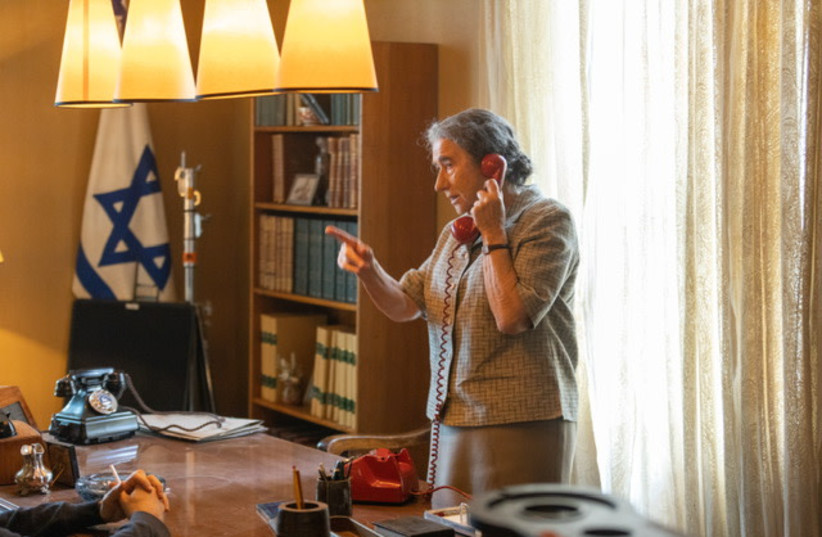Eager to gain some insights into the role played by Richard Nixon, America’s 37th president, during the 1973 Yom Kippur War for the monograph I am writing on US presidents and the Jews, I happily bought a ticket for the recently released film, Golda.
The film showed much artistry relating to Helen Mirren’s superb performance as Golda, but historically speaking, Nixon’s heroism deserved at least shared billing. Without his order to militarily resupply a devastated nation, Israel might well have gone under.
In fact, the case could be made that Nixon’s brave move ranks as the single most significant action by an American president in relations between the two nations. Instead, Nixon appears in the film in only one scene, a tv clip with some banal comments on peace. In the film, the American diplomatic load is carried by a dour, tight-lipped Henry Kissinger, who at least in one scene compliments Golda on her homemade borscht.
No other president shared Nixon’s obsession with Jews, which made his behavior in the Yom Kippur War so seemingly out of character, as revealed most sharply in the 445 hours of White House tape recordings between February-July 1971. Nixon’s accusations against Jews include, “The Jews are born spies… You can’t trust the bastards. They turn on you... Most Jews are disloyal.”
Historians do not attribute Nixon’s bigotry to any particular episode in his early years. Rather, his outlook was a reaction to the inordinate liberalism of American Jews, and more specifically to the presence of certain Jews in the leadership of the American Communist Party in the post-World War II Red Scare environment.

Despite Nixon’s suspicion and hostility towards American Jews, he stands out among presidents for taking the boldest risks for Israel, indeed possibly saving Israel from being destroyed during the Yom Kippur War. Nixon ignored the advice of his Secretary of State Henry Kissinger who wanted the war to play out a little longer so that Egypt President Anwar Sadat would have the political cover to make peace in the war’s aftermath.
"Double it"
Alexander Haig, Nixon’s chief of staff, reported in his memoir Inner Circles, Nixon’s sense of urgency in coming to Israel’s aid. Nixon summoned both Kissinger and James Schlesinger (a Jewish convert to Christianity), Secretary of Defense, to a White House meeting assessing the pace of the much needed airlift requested by Golda. Nixon asked Kissinger for an exact account of Israel’s military needs. Kissinger began reading from an itemized list. “Double it,” ordered Nixon. “Now get the hell out of here and get the job done.”
In another such meeting, Nixon informed about bureaucratic disagreements in the Pentagon over types of delivery planes, shouted at Kissinger “(expletive) it, use every one we have. Tell them to send everything that can fly.”
Though Nixon was in the throes of fighting the Watergate charges, in June, 1974, two months before he resigned his presidency, he became the first incumbent president to visit Israel. In his expansive airport tribute (no doubt with Golda in mind) Nixon said, “the respect and the admiration we have for the people of this nation, their courage, their tenacity, their firmness in the face of very great odds… makes us proud to stand with Israel.”
In sum, this president haunted by the specter of disloyal American Jews, had little to gain and much to lose by the bold steps he took in Israel’s defense less than a year earlier. None of this courage and defiance of the US State Department is documented in the biopic Golda.
In the absence of the astonishing 567 missions flown by the US air force, Israel might not have survived. Already in his second term (regardless of Watergate), Nixon knew that Republicans were not going to win over the largely liberal Jewish vote. Nixon’s unconventional airlift subsequently spurred an Arab oil embargo sharply raising gasoline prices.
Dismissing the advice of Kissinger, his Jewish adviser, Nixon risked a war with the Soviet Union to save Israel. According to Stephen E. Ambrose, Nixon’s biographer, he “knew that his enemies would never give him credit for saving Israel. He did it anyway.”
A proud Nixon boasted, “Christ, if it weren’t for me, there wouldn’t be any Israel. They know that in Israel. Golda knows that, even though they may not know it over here.”
The writer is an emeritus professor of political science at City University of New York.
